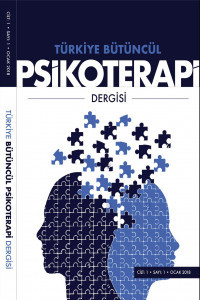Hücum Terapisi Sürecine Çözüm Odaklı Yaklaşım’ın Entegrasyonu: Vakalar Üzerinden Nitel Bir Analiz
Bu çalışmanın temel amacı, Nevrotik bireylerle yapılan terapi sürecinde hücum tedavisinin etkisini ortaya koymak ve çözüm odaklı yaklaşımın Hücum Tedavi sürecine katkısını incelemektir. Bu inceleme nitel araştırma yöntemi kullanılarak yapılmıştır. Analiz yapılırken Çözüm Odaklı Hücum Terapisi uygulanan danışanların ifadelerinden ve terapistin gözlem ve görüşlerinden yararlanılmıştır. Çalışma, Bütüncül Terapi ve Çözüm Odaklı Terapi eğitimi almış terapist tarafından 2016-2017 yılları arasında gerçekleştirilmiştir. Çözüm Odaklı Hücum Terapisinin etkileri, yaşları 22-40 arasında değişen iki erkek iki bayan olmak üzere dört nevrotik vaka üzerinden ortaya konulmaya çalışılmıştır. Araştırmaya dair genel bulgu ve sonuçlar, vakaların semptomlarının ortadan kalkmasıyla birlikte, bireylerin kendilerini daha iyi tanıdıklarını ve geleceğe dair pozitif, çözüm odaklı bir bakış açısı kazandıklarını göstermiştir.
Anahtar Kelimeler:
Çözüm Odaklı Yaklaşım, Hücum Tedavisi, Nitel Analiz
Integrating the Solution-Focused Approach to the Offensive Therapy Process: A Qualitative Analysis on the Events
The purpose of this research is to study the effect of offensive treatment on the therapy and analyze the positive effects of solution focused approach to the offensive treatment process. The qualitative research method was used in this study. The analysis process benefits from the advisees statement and the therapists observations and views. The study was carried out by a therapist which received holistic therapy and solution focused therapy between the years 2016-2017. The effects of the offensive treatment were tried to be carried out by collaborating with two male and two female advisees aged between 22-40, in total four neurotic cases. As the findings and results to the study, along with the symptoms of the cases fading away, the advisees better understand themselves, positive toward the future and are solution oriented.
___
- Berg, I. K. ve Miller, S. D. (1992). Working with the problem drinker: A solution-focused approach. New York: W.W. Norton.
- Cade, B., ve O'Hanlon, W. H. (1993). A brief guide to brief therapy. New York: W. W. Norton.
- Corcoran, J. (1997). A solution-oriented approach to working with juvenile offenders. Child and Adolescent Social Work Journal, 14, 277-288.
- Corey, G. (2008). Psikolojik danışma, psikoterapi kuram ve uygulamaları, (T. Ergene, Çev.). Ankara: Mentis Yayıncılık.
- De Jong, P. ve Berg, I. K. (1998). Interviewing for solutions. Pacific Grove: Brooks/Cole.
- De Shazer, S. (1988). Clues investigating solutions in brief therapy. New York: W.W.
- Norton. Dewan, M. J., Steenbarger B. N. ve Greenberg R. P. (2004). Bir sanat ve bilim olarak kısa terapiler: Uygulayıcılar için bir rehber (P.G.Gökalp, çev.). Ankara: Türk Psikiyatri Derneği Yayınları.
- Dölek, N. ve Kurter, F. (2012). Çözüm odaklı kısa danışmanlık yaklaşımı, seminer notları. İstanbul: Bahçeşehir Üniversitesi Kariyer Merkezi.
- Gingerich, W. J. ve Eisengart, S. (2000). Solution-focused brief therapy: A review of the outcome research. Family Process, 39, 477-498.
- Gladding, S. T. (2013). Psikolojik danışma. (N.V.Acar ve T.Sarı, çev.). Ankara: Nobel Akademik Yayıncılık.
- Köktuna, Z. S. (2007). Çözüm odaklı kısa terapi tekniğinin alt sosyo ekonomik seviyedeki kadınların geleceğe umut ile bakabilme ve boyun eğici davranışlarına etkisinin incelenmesi. Yüksek lisans tezi, Maltepe Üniversitesi, Sosyal Bilimler Enstitüsü.
- Levenson, H. (2010). Kısa dinamik terapi, (T.Özakkaş, çev.). İstanbul: Psikoterapi Enstitüsü Eğitim Yayınları.
- Murdock, N. L. (2012). Psikolojik danışma ve psikoterapi kuramları, (F.Akkoyun, çev.). Ankara: Nobel Akademik Yayıncılık.
- Murphy, J. J. (1997). Solution-focused counseling in middle and high schools. Alexandria, VA: American Counseling Association.
- Özakkaş, T. (2014). 13. Bütüncül terapi eğitimi, teorik dönem ders notları. İstanbul: Psikoterapi Enstitüsü.
- Özakkaş, T. (2015). 13. Bütüncül terapi eğitimi, formülasyon dönemi ders notlar. İstanbul: Psikoterapi Enstitüsü.
- Presbury, J. H., Echterling, L. G. ve McKee, J. E. (2002). Ideas and tools for brief counseling. Upper Saddle River, NJ: Merrill Prentice Hall.
- Prochaska, J. O. ve Norcross J. C. (2013) Psikoterapi sistemleri: Teoriler ötesi bir çözümleme, (T.Özakkaş, çev). İstanbul: Psikoterapi Enstitüsü Yayınları.
- Reiter, M. D. (2010). Hope and expectancy in solution-focused brief therapy. Journal of Family Psychotherapy, 21, 132-148.
- Rhodes. J. (1993). The use of solution- focusd brief therapy in schools. Education Psychology in Practice, 9(1), 27-34.
- Seligman, L. ve Reichenberg, L. W. (2010). Theories of counseling and psychotherapy: Systems, strategies and skills. New Jersey: Pearson.
- Sparrer, I. (2012). Çözüm odaklı yaklaşıma ve sistemik yapısal dizime giriş, (E.Suvarierol, çev.). İstanbul: Pan Yayıncılık.
- Walter, J. L. ve Peller, J. E. (1992). Becoming solution- focused in brief counseling. NewYork: Brunner/Mazel.
- Walter, J. L. ve Peller, J. E. (2000). Recreating brief therapy: Preferences and possibilities. New York: WW Norton and Co.
- Yıldırım, A. ve Şimşek, H. (2011). Sosyal bilimlerde nitel araştırma yöntemleri. Ankara: Seçkin Yayınları.
- ISSN: 2587-2702
- Başlangıç: 2018
- Yayıncı: Psikoterapi Enstitüsü
Sayıdaki Diğer Makaleler
Mustafa TUNCER, Özge Öner KAPISIZ, Necdet DÖNMEZ
Reyhan Nuray DUMAN, Suna BAYRAM, Bilge DEMİRTAŞ
'Notadan Senfoniye' Grup Terapisi
Hücum Terapisi Sürecine Çözüm Odaklı Yaklaşım’ın Entegrasyonu: Vakalar Üzerinden Nitel Bir Analiz
Bütüncül Psikoterapi Perspektifinde Rüya Analizi; Olgu Sunumu: Nergis Vakası*
Hasan DEMİR, Özge ÖNER KAPISIZ, Necdet DÖNMEZ
Temel Felsefi Kavramlar Üzerinden Psikoterapiye Bakış
Dini Obsesyon ve Kompulsiyonların Psikoterapisinde Kuramlar, İmkanlar, Sınırlılıklar
